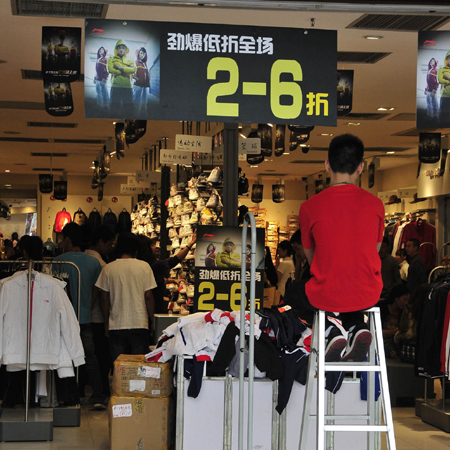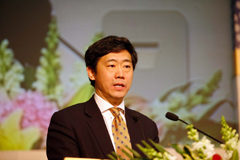Statistics
Adviser: Inflation to hit 5%
By Wang Xiaotian (China Daily)
Updated: 2011-03-10 09:33
 |
Large Medium Small |
A clothing store in Shenzhen, Guangdong province. China's consumer inflation could hit 5 percent on average this year, said Li Daokui, a central bank adviser.?[Photo / China Daily]
The surge in commodity costs could derail the fight against price rises, said adviser

BEIJING - Consumer inflation in China will rise by 5 percent on average in 2011 and surging international commodity prices will be a major cause of uncertainty as the country battles to contain that inflation, said a central bank adviser on Wednesday.
However, accelerating the appreciation of the yuan should not be used as a tool by policymakers to curb surging prices. That's the view of Li Daokui, a member of the central bank's monetary policy committee, who spoke to China Daily in an exclusive interview.
Premier Wen Jiabao vowed to keep inflation within a range of 4 percent or lower this year, when he delivered the government's annual work report to the nation's top legislative body, the National People's Congress, on March 5.
"The recent rise in inflation is quite different from the type of inflation China has suffered previously. The main cause of (today's) inflation is cost increases, that is, rising commodity prices - the cost of imported raw materials - and accelerating wage growth, which rose by between 17 and 20 percent in 2010," said Li, an economist at Tsinghua University.
|
 |
|
Li Daokui, member of the central bank's monetary policy committee |
He said that the surge in commodities prices will have a negative impact, as it will be a de facto tax on all consumers and producers. However, the rising labor cost will be beneficial for the economy, especially for people on low incomes.
Inflation will be under control this year, because overall demand in the Chinese market lags behind supply, said Li.
"We still have ample production capacity. If agricultural production is reasonably healthy, and international commodity prices don't rise too high, it's likely we can keep inflation below 5 percent," he said. "Core inflation, excluding food and fuel, will be kept well below 3 percent."
China's Consumer Price Index, a main gauge of inflation, rose to a 28-month high of 5.1 percent in November, before slowing to 4.6 in December and then picking up again to 4.9 percent in January. Some analysts predicted that the figure would rise as high as 6 percent in the first half of the year.
Li said recent droughts in some major agricultural regions and unrest in the Middle East would affect domestic inflation control, and the latter would especially be a concern.
"As the turmoil in North Africa and the Middle East leads to higher and higher crude oil prices, certainly it's a major concern for China's economy, because the country has recently imported as much as 55 percent of its oil consumption."
"An oil price of $120 or $130 a barrel might be the worst scenario for 2011." Li said, adding that the government and businesses are working to formulate plans to hedge against further increases in international commodity prices.
He predicted that China's grain output will continue to increase at a solid pace, as the northeastern region, one of the country's main grain growing areas has seen temperate weather conditions, and recent rains have eased droughts which have affected some regions.
Something akin to traditional Chinese herbal medicine is the answer to rising inflation said Li. The ingredients should include monetary policy, fiscal support, and administrative intervention, he said.
| |||||||
Li said the ratio of the country's fiscal deficit to GDP should be 5 percent this year, 3 percentage points higher than the official target revealed in Premier Wen's report.
But he said faster yuan appreciation may not be a good tool to offset imported inflation.
"We are a very large economy and a huge importer of commodities; as soon as the yuan appreciation quickens, all the commodity suppliers are likely to raise their invoice prices accordingly. In the end, we still have to pay the price," said Li.
He added that yuan appreciation of between 5 and 6 percent, together with a 17 percent increase in the annual wage, would pose a serious threat to business.
Some analysts said that a rise in the nation's foreign exchange reserves, caused by the nation's trade surplus, has increased liquidity in the domestic market and, in turn, put more pressure on inflation controls.
Li said the ratio of China's trade surplus to GDP will decline to about 2 percent this year, and to 1.5 percent in 2012. In 2010, the ratio was slightly higher than 3 percent, down from the 5.8 percent in 2009.
| 分享按鈕 |


